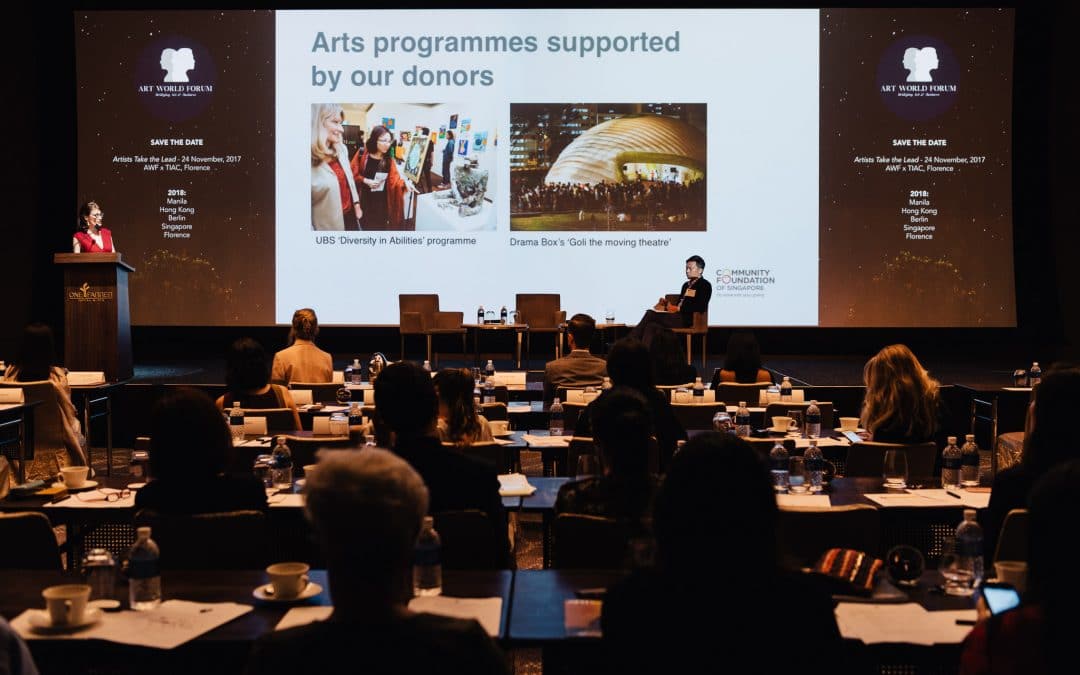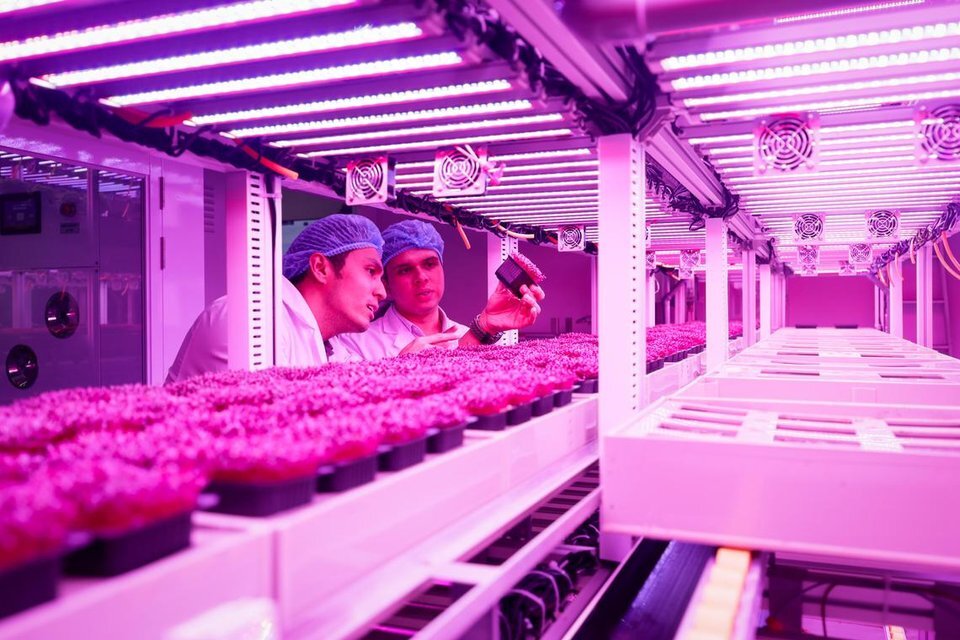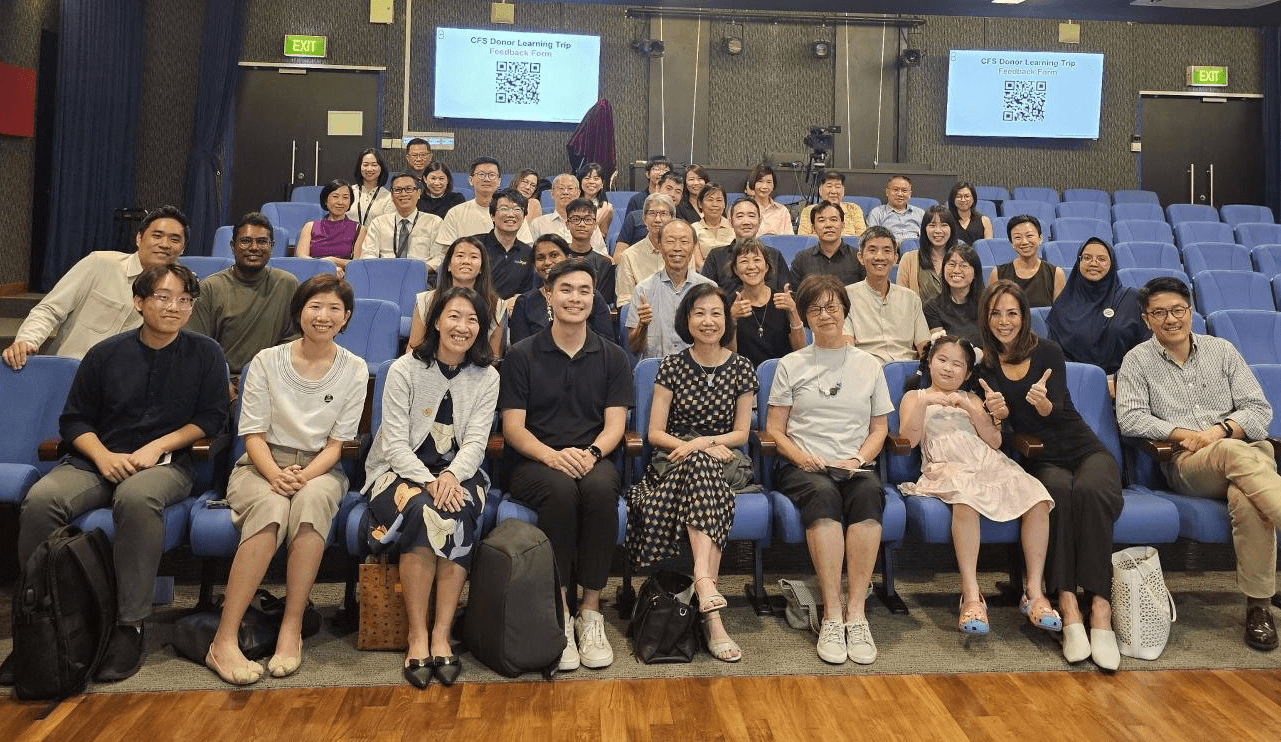The case for philanthropy in the arts


At the second edition of Art World Forum 2017: Creating Markets: Opportunities, Challenges and the Mainstream held on 27 September, the Community Foundation of Singapore (CFS) was invited to present the significance of philanthropy for the arts to an audience of art, thought and business leaders from the sector.
Moderated by Anne-Marie Clavelli, Head of Development and Strategy at CFS, along with Kola Luu, Director of Partnership Development from the National Gallery Singapore, the panel session on Art x Philanthropy: An Opportunity touched on two key questions: What is the value of the arts in a dynamic society like Singapore? Can philanthropy play a more strategic role in increasing a city’s cultural capital?
Both Anne-Marie and Kola backed up the discussion with statistics showing that while giving to the arts has been on the rise, it has also yet to mature to its full potential. Arts and Heritage only accounted for 7.1% of philanthropic donations in 2016, as compared to Social and Welfare (32.2%) and Education (25%)*.
“Why is it important for the private sector to become more involved in funding the arts?” asked Anne-Marie, “What we’ve seen across our work in CFS is that philanthropic efforts do not “substitute” government funding for causes, but address the gaps within an eco-system that the government might not be able to tackle.”
“The private sector can deliver a much-needed boost through sustained giving to the arts sector. This is particularly important as it takes time to cultivate and nurture the next generation of artists and audiences.”
Kola also noted foundations such as the Li Ka Shing Foundation and Temasek Foundation have recently added ‘building social capital’ as a key philanthropic goal. He added that art institutions could work towards demonstrating that their cause goes beyond mere art appreciation, and the arts contributes to future proofing the economy by nurturing a new generation of thoughtful, critical thinkers.
Charlotte Koh from the National Arts Council posed a question to the panellists regarding the need for strategies to sustain giving to the arts, in the face of yearly fluctuations in donations. While Kola highlighted that philanthropy to the arts should be viewed as a long-term endeavour which naturally has its ups and downs, Anne-Marie sounded an optimistic note, “Ultimately, giving to the arts is about the value of creativity in society. Singapore is a creative society, and donors will want to reflect that in how they spend their charitable dollars.”
News coverage on the event by Luxuo can be read here.
* Source: Commissioner of Charities Annual Report 2016
Photo: Art World Forum
At the second edition of Art World Forum 2017: Creating Markets: Opportunities, Challenges and the Mainstream held on 27 September, the Community Foundation of Singapore (CFS) was invited to present the significance of philanthropy for the arts to an audience of art, thought and business leaders from the sector.
Moderated by Anne-Marie Clavelli, Head of Development and Strategy at CFS, along with Kola Luu, Director of Partnership Development from the National Gallery Singapore, the panel session on Art x Philanthropy: An Opportunity touched on two key questions: What is the value of the arts in a dynamic society like Singapore? Can philanthropy play a more strategic role in increasing a city’s cultural capital?
Both Anne-Marie and Kola backed up the discussion with statistics showing that while giving to the arts has been on the rise, it has also yet to mature to its full potential. Arts and Heritage only accounted for 7.1% of philanthropic donations in 2016, as compared to Social and Welfare (32.2%) and Education (25%)*.
“Why is it important for the private sector to become more involved in funding the arts?” asked Anne-Marie, “What we’ve seen across our work in CFS is that philanthropic efforts do not “substitute” government funding for causes, but address the gaps within an eco-system that the government might not be able to tackle.”
“The private sector can deliver a much-needed boost through sustained giving to the arts sector. This is particularly important as it takes time to cultivate and nurture the next generation of artists and audiences.”
Kola also noted foundations such as the Li Ka Shing Foundation and Temasek Foundation have recently added ‘building social capital’ as a key philanthropic goal. He added that art institutions could work towards demonstrating that their cause goes beyond mere art appreciation, and the arts contributes to future proofing the economy by nurturing a new generation of thoughtful, critical thinkers.
Charlotte Koh from the National Arts Council posed a question to the panellists regarding the need for strategies to sustain giving to the arts, in the face of yearly fluctuations in donations. While Kola highlighted that philanthropy to the arts should be viewed as a long-term endeavour which naturally has its ups and downs, Anne-Marie sounded an optimistic note, “Ultimately, giving to the arts is about the value of creativity in society. Singapore is a creative society, and donors will want to reflect that in how they spend their charitable dollars.”
News coverage on the event by Luxuo can be read here.
* Source: Commissioner of Charities Annual Report 2016
Photo: Art World Forum
- Related Topics For You: ARTS & HERITAGE, CHARITY STORIES, DONOR STORIES, EDUCATION, EVENTS, OPINION



